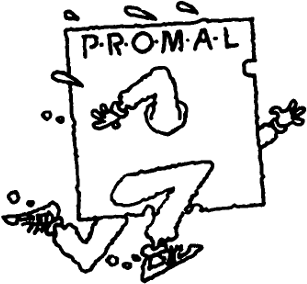 | |
| Paradigm | Imperative (procedural), structured |
|---|---|
| Developer | Systems Management Associates |
| First appeared | 1984-08-16 |
| Stable release | 2.1e
/ 1986-10-14 |
| Filename extensions | .s |
| Influenced by | |
| C | |
PROMAL (PROgrammer's Microapplication Language) is a structured programming language from Systems Management Associates for MS-DOS, Commodore 64, and Apple II. PROMAL features simple syntax, no line numbers, long variable names, functions and procedures with argument passing, real number type, arrays, strings, pointer, and a built-in I/O library. Like ABC and Python, indentation is part of the language syntax.
The language uses a single-pass compiler to generate byte code that is interpreted when the program is run. Since the memory is very limited on these early home computers, the compiler can compile to/from disk and memory. The software package for C64 includes a full-screen editor and command shell.
See also [Computer Language, Mar 1986, pp. 128–134].
Ahoy! called PROMAL for the Commodore 64 "one of the best" structured languages. It concluded "As an introduction to structured programming languages and as an alternative to BASIC, PROMAL is well worth the time needed to learn it and the $49.95 to purchase it".[1]
From the PROMAL program disk:
PROGRAM SIEVE
; Sieve of Eratosthenes Benchmark
; test (BYTE magazine)
; 10 iterations, 1800 element array.
INCLUDE LIBRARY
CON SIZE=1800
WORD I
WORD J
WORD PRIME
WORD K
WORD COUNT
BYTE FLAGS[SIZE]
BEGIN
OUTPUT "10 ITERATIONS"
FOR J= 1 TO 10
COUNT=0
FILL FLAGS, SIZE, TRUE
FOR I= 0 TO SIZE
IF FLAGS[I]
PRIME=I+I+3
K=I+PRIME
WHILE K <= SIZE
FLAGS[K]=FALSE
K=K+PRIME
COUNT=COUNT+1
OUTPUT "#C#I PRIMES", COUNT
END
This article is based on material taken from the Free On-line Dictionary of Computing prior to 1 November 2008 and incorporated under the "relicensing" terms of the GFDL, version 1.3 or later.
By: Wikipedia.org
Edited: 2021-06-18 18:17:11
Source: Wikipedia.org